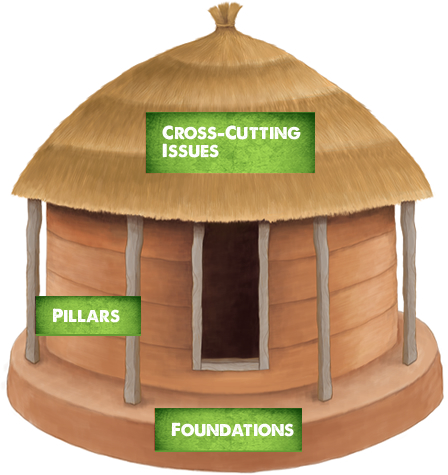Supporting Smallholder Farmers in Africa: A Framework for an enabling environment
Smallholder farmers form the backbone of economic activity in most African countries. They have the potential to play a crucial role in supplying food to the continent’s population and bringing about economic transformation in rural areas. However, government policies and practices are often unresponsive to their needs, meaning they struggle to improve their productivity or access to markets.
To start to improve the environment for farmers, we need to understand what policies and practices are beneficial to them.
With this in mind, the 'Farmers as Entrepreneurs' working group of the African Smallholder Farmers Group (ASFG) attempted to identify the factors that affect smallholder farmers and their capacity to improve their productivity and access markets. [1]
Based on a wide-ranging review of the available literature (and supported by information from a survey with our staff and partners) the ASFG created a framework of policies, laws, regulations and practices that can support Africa's smallholder farmers in becoming market ready and help them sustain their market participation. This framework can be used to guide government and donor decisions and is a useful advocacy tool for NGOs and civil society.
|
On this webpage you'll be able to access an online version of the full framework report (see the navigation bar on the left where the different sections of the report are listed) as well downloading PDF versions of the full report and framework (see Framework Resources). You can also access information and resources for advocacy (see Advocacy: Information & Resources). |

The framework is composed of three elements: foundations, pillars and cross-cutting issues which together describe the types of policies and interventions which support smallholder farmers.
Rural infrastructures, rural public services and the rural investment climate are considered foundations that support the entire rural economy.
The pillars, on the other hand, are relevant to smallholder farmers in particular and include: access to land and water; inputs and credit; markets; research and extension services and collective action.
Finally, the framework recognises the key cross-cutting issues of gender equity, climate change and food security, all of which are relevant to every area of the framework.
The World Bank has also started to develop its own framework, the Agricultural Transformation Index (ATI). The ATI will be a collection of indexes measuring different factors affecting farmers, on and off their farms. The World Bank has begun the process of creating the ATI with the development of the “Benchmarking the Business of Agriculture” (BBA) framework, which will cover mainly off-farm factors affecting productivity and access to markets: land, water, rural finance, markets, trade, rural transport, agricultural inputs and rural energy. By developing this tool, the World Bank aims to inform and influence government policies and regulatory frameworks to help facilitate the development of a commercial agriculture sector.
The ASFG has used its own framework to engage the World Bank in dialogue around the content of the BBA. We have asked for greater attention to factors affecting smallholder famers that were not included in the first draft of the BBA indicators published by the World Bank, including measures on gender, producer organisations, on-farm issues and sustainability in the BBA. We will also be providing detailed comments on the indicators suggested for use in the BBA.
We are now encouraging other organisations and individuals to comment on the World Bank's proposals – and our own, based on their expertise and experience. Therefore, as well as posting our own framework here, we are also posting the draft World Bank BBA indicators and details on who to contact to feed in your views (see Advocacy: Information & Resources). It would be useful if those who send comments and recommendations to the World Bank, including ASFG members, could share these with us so that we can track our combined effort. If you are interested in joining our collective dialogue with the World Bank, we would be very pleased to hear from you.
Our contact details are:
Claire Hickson: [email protected]
Alison Griffith: [email protected]
Kato Lambrechts: [email protected]
Sarah Montgomery: [email protected]
Download the executive summary | Download the full report | Advocacy: Information and Resources
[1] This framework is based on a literature review done by Hester Le Roux and was prepared with the assistance of ASFG member organisations who participated in ASFG Farmers as Entrepreneurs group meetings. CAFOD, Christian Aid, Self Help Africa and Practical Action staff members have led the process of finalising the report and related advocacy messages, and GardenAfrica has provided comments on the content. The content of this report does not necessarily reflect the public positions of all ASFG member organisations